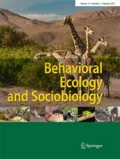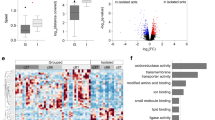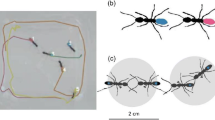Abstract
Social deprivation can have negative effects on the lives of social animals, including humans, yet little is known about the mechanisms by which social withdrawal affects animal health. Here we show that in the carpenter ant Camponotus fellah, socially isolated workers have a greatly reduced life span relative to ants kept in groups of ten individuals. By using a new tracking system, we found that social isolation resulted in important behavioral changes and greatly increased locomotor activity. The higher activity of single ants and their increased propensity to leave the nest to move along the walls suggested that the increased mortality of isolated ants might stem from an imbalance of energy income and expenditure. This view was supported by the finding that while isolated ants ingested the same amount of food as grouped ants, they retained food in the crop, hence preventing its use as an energy source. Moreover, the difference in life span between single and grouped individuals vanished when ants were not fed. This study thus underlines the role of social interactions as key regulators of energy balance, which ultimately affects aging and health in a highly social organism.




Similar content being viewed by others
References
Arnold G (1976) Mechanisms in the group effect of honeybees. C R Acad Sci Hebd Seances Acad Sci D 283:1433–1435
Boulay R, Quagebeur M, Godzinska E, Lenoir A (1999) Social isolation in ants: evidence of its impact on survivorship and behavior in Camponotus fellah (Hymenoptera: Formicidae). Sociobiology 33:111–124
Buffin A, Denis D, Van Simaeys G, Goldman S, Deneubourg JL (2009) Feeding and stocking up: radio-labelled food reveals exchange patterns in ants. PLoS One 4:e5919. doi:10.1371/journal.pone.0005919
Buie T et al (2010) Evaluation, diagnosis, and treatment of gastrointestinal disorders in individuals with ASDs: a consensus report. Pediatrics 125(Suppl 1):S1–S18. doi:10.1542/peds. 2009-1878C
Cacioppo JT, Hawkley LC (2009) Perceived social isolation and cognition. Trends Cogn Sci 13:447–454. doi:10.1016/j.tics.2009.06.005
Cognigni P, Bailey AP, Miguel-Aliaga I (2011) Enteric neurons and systemic signals couple nutritional and reproductive status with intestinal homeostasis. Cell Metab 13:92–104. doi:10.1016/j.cmet.2010.12.010
Coury DL et al (2012) Gastrointestinal conditions in children with autism spectrum disorder: developing a research agenda. Pediatrics 130(Suppl 2):S160–S168. doi:10.1542/peds. 2012-0900N
Eisner T, Happ G (1962) The infrabuccal pocket of a formicine ant: a social filtration device. Psyche 69:107–116
Grassé P, Chauvin R (1944) L'effet de group et de la survie des neutres dans les sociétées d'insectes. Rev Sci 82:261–264
Hansen L, Klotz J (2005) Carpenter Ants of the United States and Canada. Comstock Pub Assoc
Heinze J, Walter B (2010) Moribund ants leave their nests to die in social isolation. Curr Biol 20:249–252. doi:10.1016/j.cub.2009.12.031
Holt-Lunstad J, Smith TB, Layton JB (2010) Social relationships and mortality risk: a meta-analytic review. PLoS Med 7:e1000316. doi:10.1371/journal.pmed.1000316
House JS, Landis KR, Umberson D (1988) Social relationships and health. Science 241:540–545
Howard D, Tschinkel W (1981) The flow of food in colonies of the fire ant, Solenopsis invicta: a multifactorial study. Physiol Entomol 6:297–306
Hsiao EY et al (2013) Microbiota modulate behavioral and physiological abnormalities associated with neurodevelopmental disorders. Cell 155:1451–1463. doi:10.1016/j.cell.2013.11.024
Huang ZY, Robinson GE (1992) Honeybee colony integration: worker-worker interactions mediate hormonally regulated plasticity in division of labor. PNAS 89:11726–11729
Ja WW et al (2007) Prandiology of Drosophila and the CAFE assay. PNAS 104:8253–8256. doi:10.1073/pnas.0702726104
Karelina K, Norman GJ, Zhang N, Morris JS, Peng H, DeVries AC (2009) Social isolation alters neuroinflammatory response to stroke. PNAS 106:5895–5900. doi:10.1073/pnas.0810737106
Keller L, Passera L (1990) Fecundity of ant queens in relation to their age and the mode of colony founding. Insect Soc 37:116–130
Markin G (1970) Food distribution within laboratory colonies of the argentine ant, Tridomyrmex humilis (Mayr). Insect Soc 17:127–157
Matsumoto K, Pinna G, Puia G, Guidotti A, Costa E (2005) Social isolation stress-induced aggression in mice: a model to study the pharmacology of neurosteroidogenesis. Stress 8:85–93. doi:10.1080/10253890500159022
Mersch DP, Crespi A, Keller L (2013) Tracking individuals shows spatial fidelity is a key regulator of ant social organization. Science 340:1090–1093. doi:10.1126/science.1234316
Modlmeier AP, Foitzik S, Scharf I (2013) Starvation endurance in the ant Temnothorax nylanderi depends on group size, body size and access to larvae. Physiol Entomol 38:89–94. doi:10.1111/Phen.12007
Nonogaki K, Nozue K, Oka Y (2007) Social isolation affects the development of obesity and type 2 diabetes in mice. Endocrinology 148:4658–4666. doi:10.1210/en.2007-0296
Robinson GE, Page RE Jr, Strambi C, Strambi A (1989) Hormonal and genetic control of behavioral integration in honey bee colonies. Science 246:109–112. doi:10.1126/science.246.4926.109
Roger G, Pain J (1966) L'influence de la reine d'abeille (Apis mellifica L.) sur le taux de mortalité des ouvrières accompagnatrices. Ann Abeille 9:5–36
Rozanski A, Blumenthal JA, Kaplan J (1999) Impact of psychological factors on the pathogenesis of cardiovascular disease and implications for therapy. Circulation 99:2192–2217
Ruan H, Wu CF (2008) Social interaction-mediated lifespan extension of Drosophila Cu/Zn superoxide dismutase mutants. PNAS 105:7506–7510. doi:10.1073/pnas.0711127105
Seid M, Traniello J (2006) Age-related repertoire expansion and division of labor in Pheidole dentata (Hymenoptera: Formicidae): a new perspective on temporal polyethism and behavioral plasticity in ants. Behav Ecol Sociobiol 60:631–644. doi:10.1007/s00265-006-0207-z
Sitbon G (1967) L'effet de groupe et la mortalité des abeilles d'hiver et d'été, isolées et groupées. Ann Abeille 10:203–212
Sitbon G (1968a) Les sucres totaux chez l'abeille d'hiver en fonction de l'isolement. Insect Soc 15:37–44
Sitbon G (1968b) Teneur en eau et en azote chez l'abeille en fonction de l'isolement. Insect Soc 15:413–418
Smith CR, Toth AL, Suarez AV, Robinson GE (2008) Genetic and genomic analyses of the division of labour in insect societies. Nat Rev Genet 9:735–748. doi:10.1038/nrg2429
Umberson D, Montez JK (2010) Social relationships and health: a flashpoint for health policy. J Health Soc Behav 51(Suppl):S54–S66. doi:10.1177/0022146510383501
Venna VR, Xu Y, Doran SJ, Patrizz A, McCullough LD (2014) Social interaction plays a critical role in neurogenesis and recovery after stroke. Transt Psychiatry 4:e351. doi:10.1038/tp.2013.128
Wada-Katsumata A, Yamaoka R, Aonuma H (2011) Social interactions influence dopamine and octopamine homeostasis in the brain of the ant Formica japonica. J Exp Biol 214:1707–1713. doi:10.1242/jeb.051565
Wiberg GS, Grice HC (1963) Long-term isolation stress in rats. Science 142:507
Wilson E, Hölldobler B (1990) The ants. Springer, Berlin
Yang YC, McClintock MK, Kozloski M, Li T (2013) Social isolation and adult mortality: the role of chronic inflammation and sex differences. J Health Soc Behav 54:183–203. doi:10.1177/0022146513485244
Acknowledgments
We thank A. Hefetz for collecting queens, A. Crespi for the technical support for the tracking system, and the Swiss Institute of Bioinformatics for the data storage. We are grateful to M. Miura for the helpful discussion and O. Rueppel and two reviewers for useful comments. This work was funded by several grants from the Swiss National Science Foundation, the Japan Society for the Promotion of Science, and an advanced ERC grant. The funders had no role in the study design, data collection and analysis, decision to publish, or preparation of the manuscript.
Conflict of interest
We declare no conflict of interest.
Author information
Authors and Affiliations
Corresponding authors
Additional information
Communicated by O. Rueppell
Electronic supplementary material
Below is the link to the electronic supplementary material.
Figure S1
Single ants died younger than grouped ants in each age class. Average life span (± S.E.) of single (light grey) and grouped (dark grey) treatment are shown in each age class, ranging from 2 to 7 month old workers. The effect of social treatment (single versus grouped) on each age class was tested using Wald sandwich test and shown in each column. ns; p > 0.05; *p < 0.05; ** p < 0.01; *** p < 0.001 (PDF 1.77 MB)
Rights and permissions
About this article
Cite this article
Koto, A., Mersch, D., Hollis, B. et al. Social isolation causes mortality by disrupting energy homeostasis in ants. Behav Ecol Sociobiol 69, 583–591 (2015). https://doi.org/10.1007/s00265-014-1869-6
Received:
Revised:
Accepted:
Published:
Issue Date:
DOI: https://doi.org/10.1007/s00265-014-1869-6




